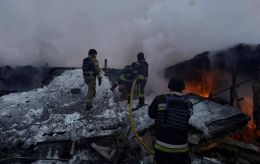Russia unable to launch large-scale counteroffensive, but threat of advance remains - ISW
 Photo: Russians will conduct local operations in certain areas of the front (facebook.com/Ministry of Defense UA)
Photo: Russians will conduct local operations in certain areas of the front (facebook.com/Ministry of Defense UA)
The Russian military command prepared for an offensive operation over several months in the summer of 2024, accumulating operational reserves and resources for its implementation. However, these resources have significantly diminished in recent months of exhausting combat, according to the Institute for the Study of War (ISW).
In May 2024, Russian troops aimed to create a new operational grouping of up to 70,000 personnel from unused operational reserves. This grouping was intended to conduct an offensive operation in the northern Kharkiv region and establish operational reserves for the Central Group of Forces to advance on Pokrovsk during the summer.
However, Russian forces likely expended a significant portion of these reserves on the stalled offensive operation in the northern Kharkiv region, intensifying their advance toward Pokrovsk and in the western part of the Donetsk region and responding to the Ukrainian incursion into the Kursk region.
Analysts at the ISW note that Russian forces also continue to suffer losses of heavily armored vehicles during large failed mechanized assaults along the entire frontline, particularly in the western part of the Donetsk region. The Russian military likely amassed large equipment for such mechanized assaults. Still, substantial medium- and long-term constraints on Russian armored supplies will become more pronounced as losses increase, potentially forcing the Russian military command to reconsider the benefits of continuing such intensive mechanized activity in Ukraine.
The ISW also states that ongoing significant losses among Russian forces in the Donetsk region and further redeployment of Russian troops to the Kursk region will weaken Russia's ability to sustain offensive operations in northeastern and eastern Ukraine. However, analysts believe that Russian forces will likely continue to reduce offensive activity in less prioritized front areas rather than doing so uniformly along the entire front line.
"The current Russian summer 2024 offensive operation will likely culminate in the coming weeks and months, but Russian forces may nevertheless continue to conduct offensive operations at a much lower tempo throughout Ukraine in hopes that consistent offensive pressure would prevent Ukrainian forces from accumulating the manpower and resources needed to contest the theater-wide initiative," the ISW report states.
Key conclusions
- Russia's offensive efforts in eastern Ukraine, which began in the fall of 2023, continue to provide the Kremlin with gradual tactical advantages in some front regions. However, significant operational gains are unlikely.
- Ukrainian forces are effectively conducting deep defense along the frontline, inflicting heavy losses on Russian troops and slowly ceding territory while preventing Russian troops from achieving quicker successes on the battlefield.
- Although Ukrainian forces face serious operational challenges and constraints that allow Russian troops to achieve tactically significant successes, Russian forces lack the manpower and resources to sustain intensified offensive actions indefinitely. Current Russian operations in eastern Ukraine are likely to culminate in the coming months, if not weeks, as previously assessed by Ukrainian officials and ISW experts.
- While Russian troops have recently made notable tactical gains, they have not demonstrated the ability to capture strategically significant objectives.
- The Russian military command continues prioritizing offensive operations in critical areas over long-term campaign planning in Ukraine. Still, Ukraine's incursion into the Kursk region appears to have significantly complicated the development of Russia's operational reserves.
- It seems that Russian leader Vladimir Putin is using the "Time of Heroes" veterans' support program to militarize regional and local government administrations and further strengthen pro-war ideology within the Russian state and society.
- In Russia, authorities continue to arrest officials on charges of mismanagement and corruption within the Ministry of Defense.
- Reports indicate that on October 3, strikes were carried out on an ammunition depot near the Russian airbase Khmeimim in Latakia province, Syria.
- Russian troops have recently advanced south of Siversk and east and southeast of Pokrovsk in the Donetsk region.
- Russian authorities continue to nationalize Russian enterprises for the federal government's benefit.
Frontline situation
Recently, Russian forces captured the city of Vuhledar in the Donetsk region. There was no encirclement of Ukrainian troops, and no significant losses among the Ukrainian Armed Forces were recorded. Ukrainian forces withdrew to preserve personnel and equipment.
According to ISW, the capture of Vuhledar by Russian troops will not fundamentally change the process of offensive operations in the Donetsk region.
Instead, Russian forces continue to advance further in the Donetsk and Luhansk regions.

